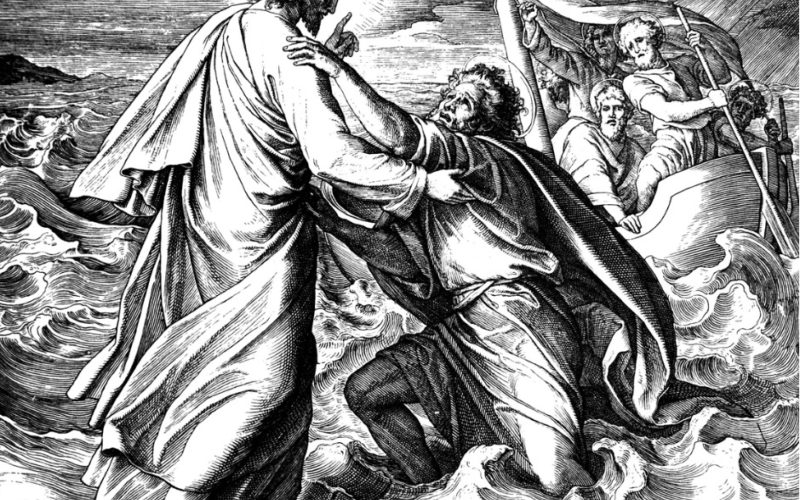A Homily for the Nineteenth Sunday in Ordinary Time, Year A
Peter said to him [viz. Jesus] in reply, “Lord, if it is you, command me to come to you on the water.” He said, “Come.” Peter got out of the boat and began to walk on the water toward Jesus. But when he saw how [strong] the wind was he became frightened; and, beginning to sink, he cried out, “Lord, save me!” Immediately Jesus stretched out his hand and caught him, and said to him, “O you of little faith, why did you doubt?”
–Matthew 14:28-31–
Father William Seifert, a fellow theology teacher at Bethlehem Catholic, drew a straight line on the floor of his classroom from front to back, dividing the room right down the middle. He then asked his high school seniors to walk the line from the back of the classroom all the way to the front. As long as the students kept their eyes focused on their own feet or on their fellow students, they veered off the line. When, however, they followed Father Seifert’s advice and fixed their attention on the crucifix that hung front and center just above the blackboard and made their way toward that, they were able to walk the line with no difficulty.
It’s like that with Christ and us. If we keep our eyes fixed on Him, we’ll be able to walk the straight and narrow as well. Saint Peter learned that lesson the hard way. Perhaps we, in turn, can learn from Saint Peter.
Keeping our eyes fixed on Jesus, however, does not mean demanding that He show us our whole future all at once. In fact, we are probably better off not knowing our distant future. The big picture would no doubt overwhelm us. Had I known while in high school that I would one day end up being a priest, I would have been horrified! No, keeping our eyes on Jesus means being content with knowing only one step at a time. Our prayer should echo these famous lines that John Henry Newman penned in 1833:
Lead, kindly light, amid the encircling gloom,
Lead Thou me on!
The night is dark, and I am far from home,
Lead Thou me on!
Keep Thou my feet; I do not ask to see
The distant scene; one step enough for me.
There is another reason why we must ask to see only one step at a time and not the distant scene. God gives us grace when we need it, in the present moment, and not before. That’s why Our Lord tells us to pray for our daily bread[1]—the sustenance for the present need—rather than for a lifetime allowance.
In her wonderful book, The Hiding Place, Dutch Protestant author and speaker Corrie ten Boom relates what happened when, as a small child, she first came to the terrible realization that her beloved Papa would one day die:
Father sat down on the edge of the narrow bed. “Corrie,” he began gently, “when you and I go to Amsterdam—when do I give you your [train] ticket?”
I sniffed a few times, considering this. “Why, just before we get on the train.”
“Exactly. And our wise Father in heaven knows when we’re going to need things, too. Don’t run out ahead of Him, Corrie. When the time comes that some of us will have to die, you will look into your heart and find the strength you need—just in time.”
There’s an old black Gospel hymn that says it best:
He may not come when you want Him,
but He’s right on time, right on time.
Sooner or later, Our Lord will call each of us to walk upon some turbulent, storm-tossed expanse of life. As He called out to Saint Peter, so He calls to us, “Come.” The best way to follow is to keep our eyes fixed on Him. The best way to do that is to ask Him to reveal no more than one step at a time. Jesus will give us the grace we need when we need it.
After we’ve been thus following Christ for a while, each one of us will be able to tell Him, along with Johnny Cash:
As sure as night is dark and day is light,
I keep you on my mind both day and night,
And happiness I’ve known proves that it’s right.
Because you’re mine,
I walk the line.
[1] Matthew 6:11.

